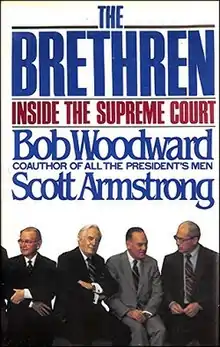The Brethren (Woodward and Armstrong book)
The Brethren: Inside the Supreme Court is a 1979 book by Bob Woodward and Scott Armstrong. It gives a "behind-the-scenes" account of the United States Supreme Court during Warren Burger's early years as Chief Justice of the United States. The book covers the years from the 1969 term through the 1975 term. Using Woodward's trademark writing technique involving "off-the-record" sources, the book provides an account of the deliberations leading to some of the court's more controversial decisions from the 1970s. Among the cases with substantial treatment in the book was the decision in United States v. Nixon (1974), where the Supreme Court unanimously ruled that President Richard Nixon was legally obligated to turn over the Watergate tapes. In 1985, upon the death of Associate Justice Potter Stewart, Woodward disclosed that Stewart had been the primary source for The Brethren.[1]
 First edition | |
| Author | Bob Woodward and Scott Armstrong |
|---|---|
| Country | United States |
| Language | English |
| Subject | Supreme Court of the United States |
| Publisher | Simon & Schuster |
Publication date | 1979 |
| Pages | 467 |
| ISBN | 978-0-671-24110-0 |
| OCLC | 61201839 |
The book begins with the exit of Chief Justice Earl Warren from the supreme court after the Senate refused to allow Lyndon Johnson to make an appointment. Richard Nixon, the current president of the United States, selects justice Warren Burger for the court and he is subsequently confirmed. With a more conservative Chief Justice on the bench Republicans wish to undo many of the liberal decisions that were brought down under the Warren Court. The current divisions in the court place Justice Burger to the right of all existing justices. John Marshall Harlan and Byron White comprised the more conservative side of the court while Justices Hugo Black, William Douglas, William Brennan and Thurgood Marshall took up the left. Justice Potter Stewart (the narrator) remained in the center.
Throughout the book many supreme court justices come and go over the 6 year period the book covers. Justice Hugo Black and John Harlan both leave the court in 1971 and are replaced by Harry Blackmun - the famous author of the opinion Roe v. Wade - and William Rehnquist furthering the rightward shift. Justice William O. Douglas, the most powerful liberal on the bench is forced to resign at the end of the novel furthering the end of the liberal control of the bench.
The book's sources are highly critical of Burger as Chief Justice, especially in comparison to his predecessor, Earl Warren. Burger is described by other Justices as pompous, devious, and intellectually inferior. The book is also critical at various points of William O. Douglas, who is portrayed as having gone from one of America's greatest jurists to a "nasty, petulant, prodigal child" who was overly political, and is also occasionally critical of another liberal stalwart, Thurgood Marshall, for his intellectual laziness and apathy.
The book does frequently lend out praise to other Justices though. Stewart, who was one of the primary sources for the book, is portrayed in a positive light, as is William J. Brennan, the acknowledged leader of the liberal bloc of justices, both for his intelligence as well as his amiable, friendly personality. The book also issued some particular praise for Justices Harlan and Powell.